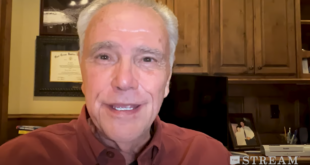God created us in His image. We were made for relationship, fellowship, stewardship and productive fruitfulness. The first relationship which profoundly affects all other relationships begins with our commitment to faith in and fellowship with Father God. It is on this meaningful relationship all others are to be built. We are to love God first and foremost and love our neighbors with the same legitimate concern we have for our own well-being. When we remove God from first place personally or nationally, we will rapidly begin to fail one another – our neighbors. Individuals then become ineffective as their brother’s keeper. Compassion diminishes on a large scale and the imposed intrusive power of a totalitarian state will begin rising up contributing to the destruction of meaningful relationships. (This devaluation of humanity and resulting devastation caused by the overreaching political tyranny is revealed chillingly in the current #1 movie “The Hunger Games” which many young people are flocking to.)
In our book INDIVISIBLE Jay Richards and I point out very clearly that as people created by God, we are inherently and specifically social. Meaningful life is found in meaningful relationships. The following excerpt covers one of the 10 first principles of faith, family and freedom.
Each of us has value by virtue of being human, but as God said of Adam, it is not good for man to be alone. No man is an island. Our many, diverse relationships also define us. Our relationship with God is the most fundamental one, even if we fail to recognize it. God does not need us, but He created each of us, He loves us, and He sustains us at every moment. Our value comes from this unique relationship. “For you formed my inward parts/you knitted me together in my mother’s womb,” says Psalm 139. God is closer to the unborn child than that child is to his mother.
After our relationship with God come our relationships with other people. Here, there are more varieties than there are flavors of ice cream. As children, we depend on our parents. Our relationship with our father is not the same as our relationship with our mother. As parents, we’re responsible for our children; we love them, sacrifice for them, and can’t imagine life without them. As spouses, we give ourselves to another person uniquely. Marriage is so profound that Paul compared it to Christ’s relationship to the Church!
As Christians, we are members of Christ’s body, surrounded by the great cloud of witnesses that have gone before us (Hebrews 12). We seek communion with others and develop natural ties among our fellow countrymen. We pray, live, learn from and with others. We work with others, trade goods and services with others, and, when we are free, create value for ourselves and others. Just as we have rights that others are bound to recognize, we also have obligations to our fellow human beings, especially for those in need – the poor, the orphaned, the widowed, the outcast. “Pure and undefiled religion in the sight of our God and Father is this: to visit orphans and widows in their distress, and to keep oneself unstained by the world.” Pure religion helps and builds relationships; it binds up the brokenhearted, restores the disgraced and lifts those who have fallen.
We’re belaboring this point because it’s easy to distort this principle. We can best help the hurting when we practice well-thought-out acts of charity, not random acts of kindness. Moreover, when charity is replaced by political coercion, it tends to hurt rather than help.
Some libertarians view individuals as isolated atoms and miss this principle altogether. Socialists make a near-opposite mistake: they confuse society with the state. Socialism can appeal to well-meaning people who seek community; but it destroys real community. Under socialism, the quirky variety of real relationships – spouses, parents, children, friends, coworkers, trading partners – is dissolved and confused by a coercive state, leaving poverty, enmity, and envy in its wake.
It might seem paradoxical, but policies that do not respect the natural diversity of our relationships end up violating our rights as individuals. A well-known twentieth-century politician said approvingly, “In fundamental theory socialism and democracy are almost if not quite one and the same. They both rest at bottom upon the absolute right of the community to determine its own destiny and that of its members.” These words belong to President Woodrow Wilson, an ardent progressive.
Just policies, in contrast, respect the natural diversity of our relationships. The way the federal government ought to relate to citizens, for instance, is not the same as the way a mother relates to her children. The government is charged with protecting our rights. It’s not our mommy.
Today’s secular left makes a hash of relationships because it is a confused hybrid of libertine individualism and collectivism. On matters of sexuality, it’s every man and woman for him- or herself. If it feels good, do it. Yet the secular leftist wants the coercive state involved in pretty much everything else. In fact, most leftists, are infatuated with international governance. On this view, taken to its logical conclusion, ordinary patriotism is not a healthy, natural expression of our social natures, but a dangerous and jingoistic nationalism.
Finally, while most of our relationships involve other persons – God and other human beings – we also depend on the earth and its creatures for our sustenance. The earth is the Lord’s, and we are made from its dust; but the Lord has made us stewards over it. So we should treat the creation responsibly while never mistaking it for the Creator.
This article has been adapted from INDIVISIBLE by James Robison and Jay W. Richards. Copyright © 2012 by James Robison and Jay Richards. With permission from FaithWords. All rights reserved.
 James Robison A Weekly Commentary
James Robison A Weekly Commentary
